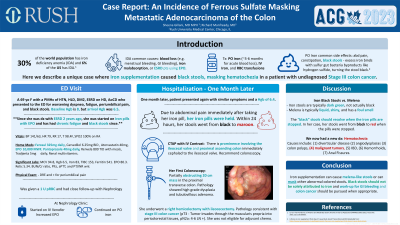Sunday Poster Session
Category: Colon
P0255 - Case Report: An Incidence of Ferrous Sulfate Masking Metastatic Adenocarcinoma of the Colon
Sunday, October 22, 2023
3:30 PM - 7:00 PM PT
Location: Exhibit Hall

Has Audio
- SG
Sheena Gillani, MD, MPH
Rush University Medical Center
Chicago, Illinois
Presenting Author(s)
Sheena Gillani, MD, MPH, Richard Manfready, MD
Rush University Medical Center, Chicago, IL
Introduction: As of 2023, colorectal cancer was the was the third most common cancer in the US. Most patients are asymptomatic, but can present with melena, hematochezia, or unexplained iron deficiency anemia. Sometimes, these patients are taking oral iron, which can cause melena-like stools. In rare instances, iron can mask signs of Gi bleeding, either by darkening bright red stools or by falsely attributing melena to iron supplementation. Here we describe a unique case where iron supplementation masked hematochezia in a patient with undiagnosed Stage III colon cancer.
Case Description/Methods: This patient was a 69-year-old female with a history of hypertension, hyperlipidemia, type 2 diabetes, end stage renal disease on hemodialysis, iron deficiency anemia with a baseline hemoglobin of 8 on iron supplementation who presented to the ED for worsening dyspnea and periumbilical abdominal pain, found to have a hemoglobin of 6.5. She had chronic iron deficiency secondary to kidney disease and had been on iron supplementation for two years. Since then, she has had melena-like stools, as recently as the day of admission. She denied any NSAID use, did not drink alcohol or smoke, had not used steroids recently, and was taking Protonix 40mg daily. Physical exam was significant for negative digital rectal exam and periumbilical abdominal tenderness. She was discharged after transfusion and had close follow-up with nephrology, where she received IV Venofer, an increased dose of EPO, and continued daily iron. Despite these interventions, she was hospitalized one month later for a Hgb of 6.4. Given her persistent abdominal pain, a CTAP with IV contrast was ordered, which showed mild inflammation of the terminal ileum and cecum. Her PO iron was stopped to prevent further abdominal discomfort and her melena-like stool turned into hematochezia the next day. Given this new finding, GI was consulted and a colonoscopy was completed, which showed a partially obstructing mass in the proximal transverse colon with pathology confirming high grade dysplasia and tubulovillous adenoma. The patient underwent a right hemicolectomy, with pathology consistent for Stage III colorectal cancer.
Discussion: Overall, iron supplementation is often used for treating iron deficiency anemia, with melena-like stools being a common side-effect. It is imperative that these stools should not be solely attributed to iron supplementation and that work-up for gastrointestinal bleeding and colon cancer be pursued when appropriate.
Disclosures:
Sheena Gillani, MD, MPH, Richard Manfready, MD. P0255 - Case Report: An Incidence of Ferrous Sulfate Masking Metastatic Adenocarcinoma of the Colon, ACG 2023 Annual Scientific Meeting Abstracts. Vancouver, BC, Canada: American College of Gastroenterology.
Rush University Medical Center, Chicago, IL
Introduction: As of 2023, colorectal cancer was the was the third most common cancer in the US. Most patients are asymptomatic, but can present with melena, hematochezia, or unexplained iron deficiency anemia. Sometimes, these patients are taking oral iron, which can cause melena-like stools. In rare instances, iron can mask signs of Gi bleeding, either by darkening bright red stools or by falsely attributing melena to iron supplementation. Here we describe a unique case where iron supplementation masked hematochezia in a patient with undiagnosed Stage III colon cancer.
Case Description/Methods: This patient was a 69-year-old female with a history of hypertension, hyperlipidemia, type 2 diabetes, end stage renal disease on hemodialysis, iron deficiency anemia with a baseline hemoglobin of 8 on iron supplementation who presented to the ED for worsening dyspnea and periumbilical abdominal pain, found to have a hemoglobin of 6.5. She had chronic iron deficiency secondary to kidney disease and had been on iron supplementation for two years. Since then, she has had melena-like stools, as recently as the day of admission. She denied any NSAID use, did not drink alcohol or smoke, had not used steroids recently, and was taking Protonix 40mg daily. Physical exam was significant for negative digital rectal exam and periumbilical abdominal tenderness. She was discharged after transfusion and had close follow-up with nephrology, where she received IV Venofer, an increased dose of EPO, and continued daily iron. Despite these interventions, she was hospitalized one month later for a Hgb of 6.4. Given her persistent abdominal pain, a CTAP with IV contrast was ordered, which showed mild inflammation of the terminal ileum and cecum. Her PO iron was stopped to prevent further abdominal discomfort and her melena-like stool turned into hematochezia the next day. Given this new finding, GI was consulted and a colonoscopy was completed, which showed a partially obstructing mass in the proximal transverse colon with pathology confirming high grade dysplasia and tubulovillous adenoma. The patient underwent a right hemicolectomy, with pathology consistent for Stage III colorectal cancer.
Discussion: Overall, iron supplementation is often used for treating iron deficiency anemia, with melena-like stools being a common side-effect. It is imperative that these stools should not be solely attributed to iron supplementation and that work-up for gastrointestinal bleeding and colon cancer be pursued when appropriate.
Disclosures:
Sheena Gillani indicated no relevant financial relationships.
Richard Manfready indicated no relevant financial relationships.
Sheena Gillani, MD, MPH, Richard Manfready, MD. P0255 - Case Report: An Incidence of Ferrous Sulfate Masking Metastatic Adenocarcinoma of the Colon, ACG 2023 Annual Scientific Meeting Abstracts. Vancouver, BC, Canada: American College of Gastroenterology.
